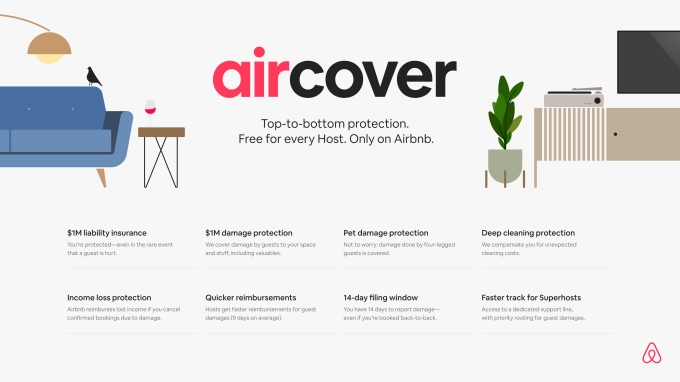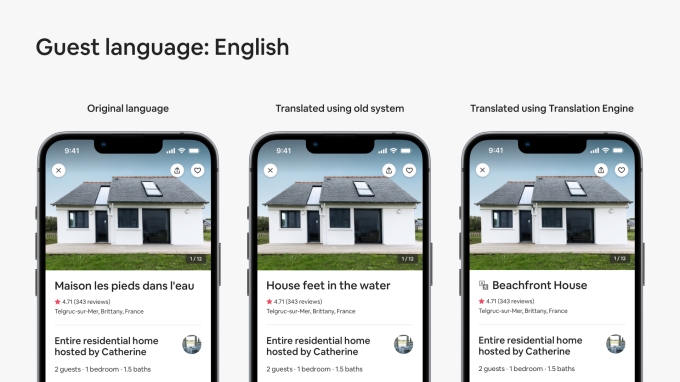Last night, Airbnb CEO Brian Chesky took to Twitter to share what he’s seeing in the company’s data. The broad strokes version was that the pandemic-induced flexibility in our work lives has allowed more people to travel during the week, and even travel for months at a time, effectively living on Airbnb.
To respond to this behavior change, Airbnb is today releasing a broad variety of new features to the platform.
Let’s dig in.
Perhaps one of the biggest challenges with the renewed interest in travel, and the desire to travel and live anywhere for longer periods of time, is that supply has to meet demand. Airbnb wants to make sure that there are enough hosts to handle changing customer demand preferences, so it’s investing in making their experience better. To offer hosts more protection, Airbnb is introducing AirCover.
AirCover is top-to-bottom coverage for the home and is now free to all hosts on the platform. It’s up to $1 million in damage protection and $1 million in liability coverage. This also includes income loss protection, pet damage protection, and deep cleaning protection.
The coverage product offers a 14-day filing window and promises faster reimbursements to hosts who file a claim, with an even faster track for Superhosts.
Airbnb’s Host Protection plan, which has been around for a long time now, has always offered up to $1 million in both damages protection and liability coverage, but there were plenty of gaps in that coverage. For example, income loss for superhosts who needed to take time off of the platform or cancel bookings for repairs were not covered for the loss of that income. Damage caused by pets was also not included in the coverage.
Pet damage coverage will indeed be a big one for hosts and guests alike. The pandemic led many folks to get themselves a furry friend and now those same folks want to travel. But hosts, for good reason, are not often keen on allowing pets into their properties, which is again creating a big gap between supply and demand.
Pet damage protection should naturally readjust that imbalance.
AirCover is actually a pretty huge deal in that it expands beyond Host Protection, which covered the structure of the home but not the property inside of it. AirCover covers most of the goods in the home, with several exclusions like fine art, currency, automobiles and other vehicles like boats and jets, weapons, security cameras, and precious metals and/or jewelry. Even with these exclusions, it’s a huge step up from the original policy, which didn’t cover things like furniture damage or theft of items.
You can check out the full list of exclusions here.
For those interested in the nitty gritty, Airbnb’s AirCover is provided through a policy issued by Zurich Insurance plc in most locations. In some jurisdictions, where a locally issued policy is required by regulation, coverage may be provided by a Zurich Insurance plc partner company, according to Airbnb.

Image Credits: Airbnb
Alongside AirCover, Airbnb is also introducing a Translation Engine. The engine translates in more than 60 languages, and removes ‘click to translate’ buttons by automatically translating listing descriptions and reviews to the user’s language of choice. Not only does the Translation Engine remove the need to click to translate, but it actually translates better, according to the company.

Image Credits: Airbnb
Accessibility Review and Verified WiFi are two new features aimed at accuracy. Listings often say they have met accessibility requirements or that they have super-fast wifi, but fall short of expectations.
With Accessibility Review, hosts submit pictures of their accessibility features and they are manually reviewed by a team of actual humans. Thus far, this team has reviewed and confirmed the accuracy of 100,000 accessibility features in 25,000 homes around the world.
Verified Wifi allows hosts to test their listing’s connection right from Airbnb itself and have the speeds verified, so guests coming to work, and not just play, in that space can rely on their connection.
These new features are a few of the biggest that Airbnb is announcing today, but the company is also doubling down on products that have been immensely popular.
‘I’m Flexible’, for example, has been used more than 500 million times since it was released in February 2021. Flexible search allows guests to be flexible around the location they’d like to visit, the dates they’d like to travel, and even the type of residence they’d like to stay in.
Because people are so drawn to this flexible search concept, Airbnb is expanding the date range you can use flexible search from six months to twelve months out. The company has also added four new categories of unique stays, including off the grid, ski-in/ski-out, luxe, and offbeat homes.
In terms of fine-tuning the service, Airbnb has redesigned the My Trips tab to keep all the information you need in one place, including a countdown timer for your reservation, check-in details, a list of upcoming reservations, and personalized Experiences suggestions.
I’m speaking with Chesky in a couple of hours and will chat with him about this news, as well as his long-term vision for the company based on the trends he’s seeing in the travel space. I’ll update this post with a link to the interview.

